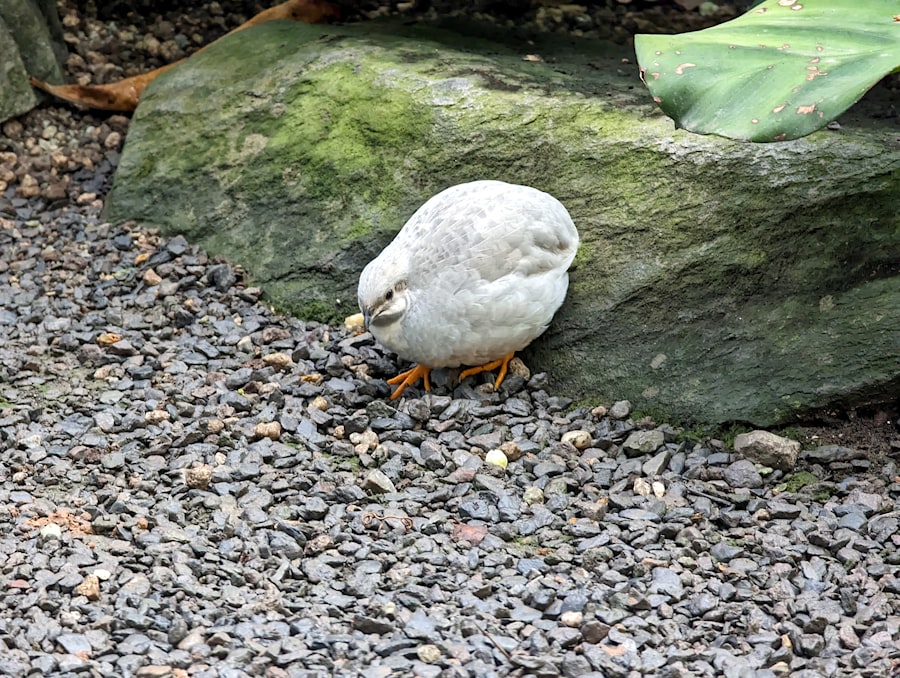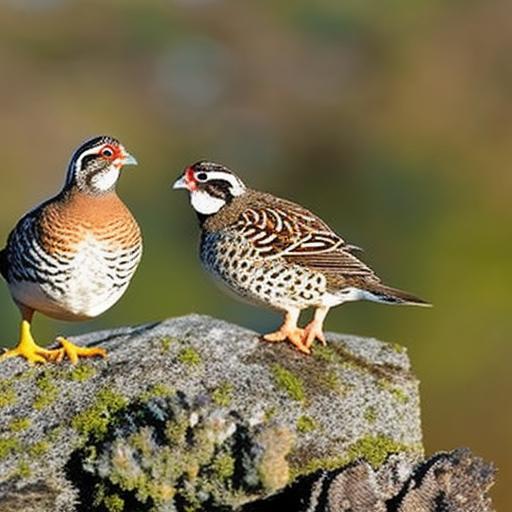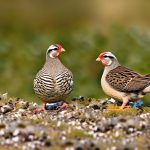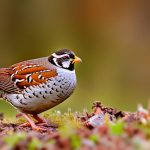Quail keeping has become increasingly popular among hobbyists and small-scale farmers due to the low maintenance and space requirements of these birds. Quails are small, ground-dwelling birds that are known for their delicious eggs and meat. They are also relatively easy to care for, making them an ideal choice for those who are new to poultry keeping. Quails come in a variety of breeds, each with its own unique characteristics and traits. Whether you are interested in raising quails for their eggs, meat, or simply as pets, there is a breed that will suit your needs. In this article, we will explore the different aspects of quail keeping, from choosing the right breed to setting up a habitat, feeding and nutrition, health and wellness, breeding and incubating eggs, and tips for successful quail keeping.
Quail keeping can be a rewarding and enjoyable experience, whether you are a seasoned poultry keeper or a beginner. With the right knowledge and preparation, you can create a thriving environment for your quails and enjoy the benefits of their eggs and meat. By understanding the specific needs of quails and providing them with proper care, you can ensure that they live healthy and happy lives. In the following sections, we will delve into the various aspects of quail keeping, providing you with valuable information to help you get started on your quail keeping journey.
Key Takeaways
- Quail keeping is a rewarding hobby that requires proper knowledge and care to ensure the well-being of the birds.
- When choosing a quail breed, consider factors such as egg production, temperament, and space requirements to find the right fit for your needs.
- Setting up a quail habitat involves providing adequate space, shelter, and protection from predators to create a safe and comfortable environment for the birds.
- Feeding and nutrition for quails should include a balanced diet of commercial feed, fresh greens, and access to grit and calcium for optimal health and egg production.
- Monitoring the health and wellness of quails involves regular observation, providing clean water, and addressing any signs of illness or injury promptly.
Choosing the Right Quail Breed
When it comes to choosing the right quail breed for your needs, there are several factors to consider. Different quail breeds have varying characteristics, such as size, egg production, temperament, and coloration. If you are interested in raising quails for their eggs, you may want to consider breeds such as Coturnix (Japanese) quails, which are known for their high egg production and relatively docile nature. On the other hand, if you are looking to raise quails for meat production, larger breeds such as Jumbo Coturnix or Pharaoh quails may be more suitable. Additionally, if you are interested in breeding quails for their unique coloration or plumage, there are breeds such as Tuxedo, Italian, or Tibetan quails that may pique your interest.
It is important to research the specific traits and requirements of each quail breed before making a decision. Consider factors such as space availability, climate, and your intended purpose for raising quails. Some breeds may be better suited for free-range environments, while others may thrive in confinement. By carefully evaluating your needs and preferences, you can select a quail breed that aligns with your goals and resources. Additionally, it is advisable to purchase quails from reputable breeders or hatcheries to ensure the health and quality of your birds.
Setting Up a Quail Habitat
Creating a suitable habitat for your quails is essential for their well-being and productivity. Quails are ground-dwelling birds that require adequate space to move around and exhibit natural behaviors. When setting up a quail habitat, consider factors such as space requirements, shelter, bedding, and environmental enrichment. Quails are social birds that thrive in groups, so it is important to provide enough space for them to interact and establish a pecking order. A general rule of thumb is to allow at least 1 square foot of space per quail to prevent overcrowding and aggression.
Quails also require shelter to protect them from predators and harsh weather conditions. A well-ventilated coop or enclosure with secure flooring is essential to ensure the safety and comfort of your birds. Provide suitable bedding material such as straw or wood shavings to absorb moisture and provide insulation. Additionally, consider adding environmental enrichment such as perches, dust baths, and hiding spots to encourage natural behaviors and reduce stress. By creating a stimulating and comfortable habitat for your quails, you can promote their overall well-being and productivity.
Feeding and Nutrition for Quails
Proper nutrition is crucial for the health and productivity of quails. A well-balanced diet provides essential nutrients for egg production, growth, and overall vitality. Quails are omnivorous birds that require a combination of commercial feed, fresh water, and supplemental treats. When selecting a commercial feed for your quails, choose a high-quality product specifically formulated for poultry or game birds. Look for feeds that contain adequate levels of protein (around 20-25%), vitamins, minerals, and amino acids to support the unique nutritional needs of quails.
In addition to commercial feed, quails can benefit from supplemental treats such as fresh fruits, vegetables, mealworms, and greens. These treats provide variety in their diet and can serve as enrichment for their mental and physical well-being. It is important to monitor the intake of treats to prevent nutritional imbalances or obesity. Provide access to clean, fresh water at all times to ensure proper hydration and digestion. Regularly clean and refill waterers to prevent contamination and promote good health.
Health and Wellness of Quails
Maintaining the health and wellness of your quails is essential for their longevity and productivity. Regular observation and preventive care can help identify potential health issues early on and prevent the spread of diseases within your flock. Keep an eye out for signs of illness such as lethargy, decreased appetite, abnormal droppings, respiratory distress, or feather abnormalities. If you notice any concerning symptoms, consult with a poultry veterinarian or experienced quail keeper for guidance.
To promote good health in your quails, practice good biosecurity measures such as quarantine new birds before introducing them to your existing flock, regularly clean and disinfect the coop and equipment, and limit exposure to wild birds or pests that may carry diseases. Provide a clean and dry environment to prevent common issues such as respiratory infections or parasites. Additionally, consider vaccinating your quails against common diseases such as Newcastle disease or fowl pox if recommended by a veterinarian.
Breeding and Incubating Quail Eggs

Breeding quails can be a rewarding experience that allows you to expand your flock or produce new generations of birds for eggs or meat. Before embarking on breeding quails, ensure that you have a suitable breeding group consisting of healthy adult birds with a balanced sex ratio. Quails are prolific layers that can start laying eggs as early as 6-8 weeks old, depending on the breed and environmental conditions. Provide nesting boxes filled with suitable bedding material such as straw or wood shavings to encourage egg-laying behavior.
Once your quails have laid eggs, you may choose to allow them to brood naturally or collect the eggs for artificial incubation. Artificial incubation involves using an incubator to mimic the natural conditions required for embryonic development. Maintain stable temperature (around 99-100°F) and humidity levels (around 50-60%) throughout the incubation period (approximately 17-18 days) to ensure successful hatching. Monitor the development of the embryos by regularly candling the eggs to check for viability.
Tips for Successful Quail Keeping
Successfully keeping quails requires attention to detail and proactive management practices. Consider implementing the following tips to ensure the well-being and productivity of your quails:
1. Regularly clean and maintain the quail habitat to prevent the buildup of waste and pathogens.
2. Monitor the behavior and health of your quails daily to detect any signs of illness or stress.
3. Provide adequate space, shelter, and environmental enrichment to promote natural behaviors.
4. Ensure access to clean water at all times to prevent dehydration.
5. Offer a well-balanced diet consisting of commercial feed, fresh water, and supplemental treats.
6. Practice good biosecurity measures to prevent the spread of diseases within your flock.
7. Seek advice from experienced quail keepers or poultry veterinarians when in doubt about the health or management of your quails.
By following these tips and dedicating time and effort to caring for your quails, you can create a thriving environment for these fascinating birds and enjoy the benefits they have to offer. Whether you are interested in raising quails for their eggs, meat, or simply as pets, the knowledge gained from this article will help you embark on a successful quail keeping journey.
If you’re looking for tips on keeping quails, you might also be interested in learning about creating a suitable environment for them. Check out this article on large chicken coop ideas to get inspiration on how to design a spacious and comfortable living space for your quails. Creating the right coop is essential for their well-being and productivity.
FAQs
What are quails?
Quails are small, ground-dwelling birds that are often raised for their eggs and meat. They belong to the family Phasianidae, which also includes pheasants and partridges.
What do quails eat?
Quails are omnivorous birds and their diet consists of a variety of foods including seeds, insects, small fruits, and vegetation. When kept in captivity, they can be fed a commercial quail feed or a mixture of grains and seeds.
How do you keep quails?
Quails can be kept in a variety of housing setups including cages, aviaries, or coops. They require protection from predators and the elements, as well as access to food and water. It’s important to provide them with a clean and comfortable living environment.
What are the benefits of keeping quails?
Keeping quails can provide a sustainable source of eggs and meat for personal consumption. They are also relatively easy to care for and can be a good option for those with limited space.
Are there any legal restrictions on keeping quails?
Laws and regulations regarding the keeping of quails vary by location, so it’s important to check with local authorities before starting a quail-keeping operation. In some areas, a permit or license may be required.
Meet Walter, the feathered-friend fanatic of Florida! Nestled in the sunshine state, Walter struts through life with his feathered companions, clucking his way to happiness. With a coop that’s fancier than a five-star hotel, he’s the Don Juan of the chicken world. When he’s not teaching his hens to do the cha-cha, you’ll find him in a heated debate with his prized rooster, Sir Clucks-a-Lot. Walter’s poultry passion is no yolk; he’s the sunny-side-up guy you never knew you needed in your flock of friends!







